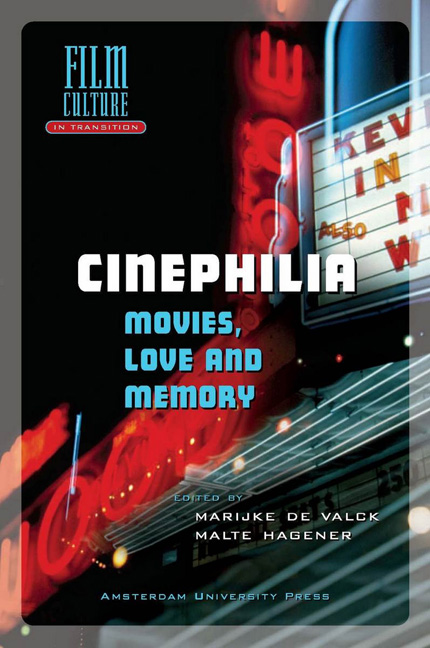Book contents
Cinephilia or the Uses of Disenchantment
Published online by Cambridge University Press: 25 January 2021
Summary
The Meaning and Memory of a Word
It is hard to ignore that the word “cinephile” is a French coinage. Used as a noun in English, it designates someone who as easily emanates cachet as pretension, of the sort often associated with style items or fashion habits imported from France. As an adjective, however, “cinéphile” describes a state of mind and an emotion that, one the whole, has been seductive to a happy few while proving beneficial to film culture in general. The term “cinephilia,” finally, reverberates with nostalgia and dedication, with longings and discrimination, and it evokes, at least to my generation, more than a passion for going to the movies, and only a little less than an entire attitude toward life. In all its scintillating indeterminacy, then, cinephilia – which migrated into the English language in the 1960s – can by now claim the allegiance of three generations of film-lovers. This fact alone makes it necessary to distinguish between two or even three kinds of cinephilia, succeeding each other, but also overlapping, coexisting, and competing with each other. For instance, cinephilia has been in and out of favor several times, including a spell as a thoroughly pejorative and even dismissive sobriquet in the politicized 2970s.
In the 1960s, it was also a contentious issue, especially during Andrew Sarris's and Pauline Kael's controversy over the auteur theory, when calling one's appreciation of a Hollywood screwball comedy by such names was simply un- American. It was a target of derision, because of its implied cosmopolitan snobbery, and the butt of Woody Allen jokes, as in a famous self-mocking scene outside the New York's Waverly Cinema in ANNIE HALL (USA: 1977). Yet it has also been a badge of loyalty for filmgoers of all ages and tastes, worn with pride and dignity. In 1996, when Susan Sontag regretted the “decay of cinema,” it was clear what she actually meant was the decay of cinephilia, that is, the way New Yorkers watched movies, rather than what they watched and what was being made by studios and directors. Her intervention brought to the fore one of cinephilia's original characteristics, namely that it has always been a gesture towards cinema framed by nostalgia and other retroactive temporalities, pleasures tinged with regret even as they register as pleasures.
- Type
- Chapter
- Information
- CinephiliaMovies, Love and Memory, pp. 27 - 44Publisher: Amsterdam University PressPrint publication year: 2005
- 6
- Cited by



